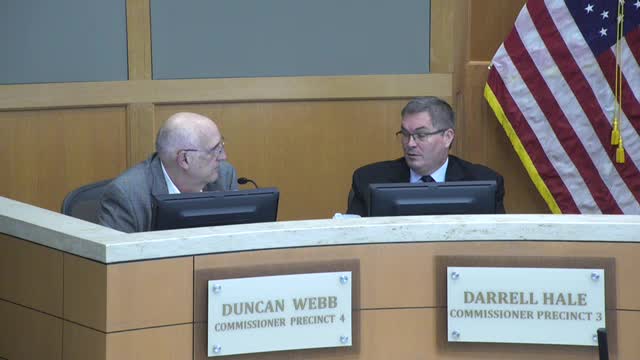Commissioner Fletcher questions budget surplus and project funding at county meeting
July 28, 2025 | Collin County, Texas
This article was created by AI summarizing key points discussed. AI makes mistakes, so for full details and context, please refer to the video of the full meeting. Please report any errors so we can fix them. Report an error »

In a recent meeting of the Collin County Toll Road Authority, key discussions centered around budget management and the allocation of surplus funds, reflecting the county's ongoing commitment to fiscal responsibility. The meeting, held on July 28, 2025, highlighted the complexities of budgeting in a growing region, particularly in light of recent public inquiries regarding a reported $36 million surplus.
Commissioner Fletcher initiated the conversation by seeking clarification from Budget Director Monica Arris about the surplus figure mentioned by a previous speaker. Arris explained that while it may appear that there is a significant surplus, many of these funds are already earmarked for ongoing projects that have yet to be officially recorded in the county's purchase orders. This means that the funds are not available for new initiatives, as they are committed to existing obligations.
The discussion underscored the importance of understanding the nuances of budget management. Arris emphasized that while the county strives to maintain a conservative fiscal approach, unspent funds at the end of the fiscal year do not equate to available resources for new projects. The county's budget is meticulously planned, with every dollar allocated to specific needs, leaving little room for unexpected expenditures without triggering a rollback election.
Further inquiries from the commissioners revealed a shared appreciation for the county's conservative budgeting practices. They acknowledged that while a surplus is beneficial for maintaining a strong bond rating, it does not imply that there are excess funds readily available for new projects or initiatives. The commissioners expressed gratitude for the careful financial stewardship that has characterized the county's approach.
Additionally, resident Joel Holyoke contributed to the discussion by advocating for the establishment of multiple districts to ensure equitable distribution of services across the county. His comments highlighted the challenges of providing consistent services in a large and diverse area, suggesting that multiple districts could enhance responsiveness to community needs.
In conclusion, the meeting served as a reminder of the complexities involved in public budgeting and the importance of transparency in financial discussions. As Collin County continues to grow, the focus on responsible fiscal management will remain crucial in addressing the needs of its residents while ensuring that funds are allocated effectively. The authority's commitment to careful budgeting practices will likely shape future discussions as the county navigates its financial landscape.
Commissioner Fletcher initiated the conversation by seeking clarification from Budget Director Monica Arris about the surplus figure mentioned by a previous speaker. Arris explained that while it may appear that there is a significant surplus, many of these funds are already earmarked for ongoing projects that have yet to be officially recorded in the county's purchase orders. This means that the funds are not available for new initiatives, as they are committed to existing obligations.
The discussion underscored the importance of understanding the nuances of budget management. Arris emphasized that while the county strives to maintain a conservative fiscal approach, unspent funds at the end of the fiscal year do not equate to available resources for new projects. The county's budget is meticulously planned, with every dollar allocated to specific needs, leaving little room for unexpected expenditures without triggering a rollback election.
Further inquiries from the commissioners revealed a shared appreciation for the county's conservative budgeting practices. They acknowledged that while a surplus is beneficial for maintaining a strong bond rating, it does not imply that there are excess funds readily available for new projects or initiatives. The commissioners expressed gratitude for the careful financial stewardship that has characterized the county's approach.
Additionally, resident Joel Holyoke contributed to the discussion by advocating for the establishment of multiple districts to ensure equitable distribution of services across the county. His comments highlighted the challenges of providing consistent services in a large and diverse area, suggesting that multiple districts could enhance responsiveness to community needs.
In conclusion, the meeting served as a reminder of the complexities involved in public budgeting and the importance of transparency in financial discussions. As Collin County continues to grow, the focus on responsible fiscal management will remain crucial in addressing the needs of its residents while ensuring that funds are allocated effectively. The authority's commitment to careful budgeting practices will likely shape future discussions as the county navigates its financial landscape.
View full meeting
This article is based on a recent meeting—watch the full video and explore the complete transcript for deeper insights into the discussion.
View full meeting
